Background to the School
Founded in 1881, Rockhampton Grammar School, an independent, co-educational boarding and day school in Queensland, Australia, boasts a rich history and a commitment to excellence in education. With a focus on fostering well-rounded individuals, the school has embraced a unique ethos that combines academic achievement with character development, emphasised in the school motto “Macte Virtute Et Litteris”, meaning “Grow in Character and Scholarship”.
The Overview
The School says: “The Rockhampton Grammar School has initiated the “Leadership For All” framework in collaboration with the Centre for Creative Leadership (CCL), a global non-profit organisation who have dedicated themselves to leadership development over the past 50 years. As a school they believe that leadership development for everyone is essential, as leadership does not require a badge. It involves people applying key attributes in a range of situations to benefit not only themselves but also the community.
The school strives to impart vital leadership competencies to staff, students, parents and the wider community. This comprehensive initiative entails workshops, self-assessment tools, and integration into pastoral programs, fostering self-awareness and collective efficacy.
Kloodle serves as the digital backbone of the programme, facilitating robust reporting and communication. By capturing diverse leadership experiences and accomplishments, Kloodle offers a holistic perspective on leadership development. Its adaptable features seamlessly align with the school’s objectives, promoting collaboration and continual growth.
The adoption of Kloodle underscores Rockhampton Grammar School’s dedication to cultivating leadership prowess and nurturing a culture of shared leadership among its stakeholders. Through this strategic partnership and innovative platform, the school aims to empower individuals to lead effectively and contribute meaningfully to their community.”
Leadership For All on Kloodle
Rockhampton Grammar School has introduced a leadership program, called ‘Leadership For All’, designed by the Center for Creative Leadership, renowned for its expertise in cultivating leadership skills. Taking a leap into the future, the school has embarked on a pilot with Kloodle, a digital platform, to develop the leadership and character skills of its students in the 15 attributes which form part of the Leadership For All framework.

Initially introduced with one class, the school has ambitious plans to extend the program to the whole year 11 group. The ultimate goal is to integrate the Kloodle platform and the program across the entire school, from Year 4 right the way through to Year 12, making Rockhampton Grammar School a pioneer and brand leader in student-led educational innovation across Australia.
This move signifies the school’s commitment to staying at the forefront of education, providing students with not only academic excellence but also the skills and character traits essential for success in the dynamic landscape of the 21st century.
The Process
In this case study, we are presenting the complete process of how students can set up a Kloodle profile, right through to being able to share that vibrant profile with key stakeholders.
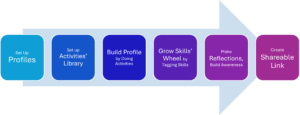
Set Up the Kloodle Profile
The first step is that data about the students is directly exported to Kloodle from the school’s internal information system. Typically, the teacher uploads a csv file with details of students’ names, their email addresses and any tags (such as classes, pupil premium, or any other filters used for comparing datasets).
The students can then simply login through a single sign on via their Microsoft or Google account and the individual profile is automatically up and running.
Choose Activities from the ‘Activities’ Library’
Activities can be uploaded en masse or individually into the ‘activities library’ on Kloodle by a member of staff typing in the activity name, assisted by the platform’s software. Typically, teachers add activities to the library on a regular basis, say weekly; they can then decide whether to keep the activity ‘live’ for future periods or archive it. Cultivating the ‘little and often’ mantra, learners systematically check in and reflect on their experiences relevant to the wider school provision. Everything they do and experience, good and bad, can contribute to a rich and meaningful profile, which truly ‘tells their story’, and enhances a deeper understanding of their own character.
The library extract below shows a wide range of activities; from playing sport and music to demonstrating leadership and character traits.
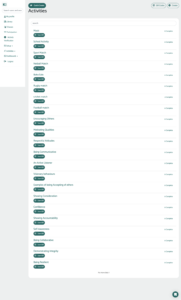
The uploaded activities identify the enrichment exercise and indicate the associated leadership skills or character traits inherent within the different experiences. The process is teacher-led, which means that tutors can ‘grab’ activities from the library and assign them to groups or categories of students as and when they decide to undertake them. This way, the system captures any student who has participated in an activity. Equally, learners can select activities they feel they have earned, and teachers can verify this at their own convenience.
Build The Profile
Kloodle allows young people to identify, record and reflect on their skills development and the scaffolding for them to build and showcase their skills and character. Skills can be identified and developed through activities at school, both in the classroom and extra-curricular.
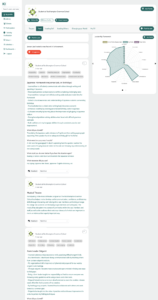 Grow The Skills Wheel
Grow The Skills Wheel
Often, one of the first exercises learners participate in is their self-assessment of their own skillset, in relation to the leadership/skills framework. This offers a starting point for their ‘actual’ skills born out of evidence generated over time. This operation assists their understanding and appreciation of the activities they should undertake to grow their skills’ profile.
Each individual student has a skills’ wheel on their Kloodle profile, such as the one below, which is used to illustrate the growth in leadership, character and skills’ development. Rockhampton Grammar uses the Center for Creative Leadership’s framework of 17 leadership values, which they want to work towards. By completing tasks, learners can identify how the progression of their aptitudes can grow their individual leadership skills’ wheel. When it does, that feels good!
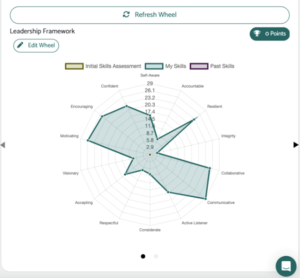
Reflections and Teacher Feedback
Students upload information about the activities they participate in; this could be a description on its own, or, accompanied by a photograph, video, document or blog. The power of reflective practice is crucial, so, in their posts, students can make their reflections on the leadership, character and skills’ development they understand they have made from the activity carried out. This also offers an opportunity to reflect on experiences which have not gone to plan or perceived failures which would otherwise not be recorded or celebrated. Through this reflective process, students can consider the evolution and learning they have gone through, for example, recording the resilience shown by picking themselves up and starting over. Turning negatives into positives is a hallmark of leadership.
It is not a requirement for teachers or mentors to review the post; however, there is space for a reviewer to add a comment or provide some feedback or encouragement after assessing the students’ post, as you can see Kyle has done in the example below. This will typically be done remotely.
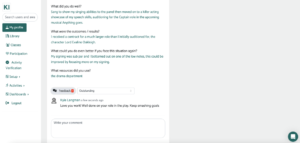
Whilst the reflective process is student-led, a post has increased recognition if it receives teacher verification and is seen as more valuable.
Class Dashboard
Teachers have their own log-in and view of a whole class or cohort of learners. In the example below, there are 27 learners in the class, 19 of whom have made reflections and have logged in 39 times, posting 47 reflections. The leadership framework skills’ wheel on the right hand side shows the leadership, character and skills’ development for the class as a whole. Down the left hand side there is a feed of the students’ posts in chronological order.
There is a facility, essentially clicking a button, through which the leadership skills’ wheel will show an overlay of the original skills’ assessment so that the teachers can view the leadership skills’ improvement or ‘distance travelled’ since the class commenced their skills’ development journey.
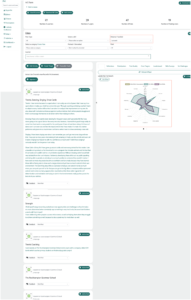
Building The Group Skills’ Wheel
Pupils can complete an activity as a class, in different groups or individually.
The picture above represents the leadership skills’ development of the whole class. If activities are carried out for the whole class, then the skills relating to that exercise can be tagged and captured on Kloodle and the skills’ wheel for a whole group or class of pupils can be presented to illustrate the growth in leadership or character development.
Create A Shareable Profile Link
One of the main goals of the leadership, character and skills’ development on Kloodle over the long term might be the desire to share the content of the profile, which is the digital record of achievement, with stakeholders, such as teachers or parents. Ultimately, it can also be used for university applications or as a CV which can be shared with a potential employer. We envision this will be the future of employment.
 The student can cherry-pick the posts and information to be shared and the shareable link will look like this below. If you would like a demo of Kloodle please book it here: https://calendly.com/kloodle/30min?back=1
The student can cherry-pick the posts and information to be shared and the shareable link will look like this below. If you would like a demo of Kloodle please book it here: https://calendly.com/kloodle/30min?back=1

